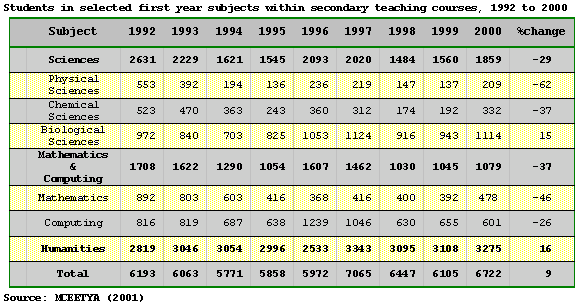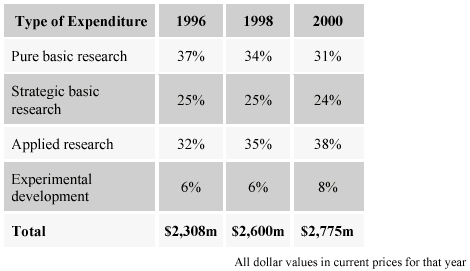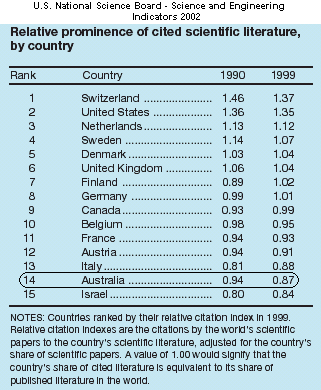|
Work = sustained effort valued as it overcomes obstacles and achieves an objective or result |
Mathematically, work can be expressed by
the equation:
|
|
where F = force, d = displacement, and the angle (theta) is defined as the angle between the force and the displacement vector. Perhaps the most difficult aspect of the above equation is the angle "theta." The angle is not just any 'ole angle', but rather a very specific angle. The angle measured is defined as the angle between the force and the displacement.
In simplified plain English if it doesn't move, you've done no work
--
no matter how much apparent effort you've exerted.
So far this year the Minister for Science, Peter McGauran and his overseer, the Minister for Education, Science and Training, Brendan Nelson, have devised the undertaking of four reviews. First Dr. Nelson instigated Higher Education at the Crossroads: A review of Australian Higher Education. As a result, over 350 submissions were received. Next Peter McGauran undertook to review National Research Priorities and says that over 180 submissions have been received. Now Dr. Nelson has announced A Review of Teaching and Teacher Education "with a particular emphasis on the fields of science, technology and mathematics." The fourth endeavour is a Review of Rural Veterinary Services which for the current argument concerns us only indirectly in that veterinarians are ultimately reliant on the sciences in order to ply their profession.
Over the past months the Department of Education, Science and
Training (DEST) has promulgated a number of issues papers which together with
the multitude of submissions has resulted in the expenditure of considerable resources as well as thousands of man and woman hours of effort by those seeking
the submissions and those producing them. Whether any productive work will
ultimately have been accomplished remains to be seen. If the outcome results in
an elaborate and costly charade, the ministers' political cynicism will eventually cost the
nation dearly.
resources as well as thousands of man and woman hours of effort by those seeking
the submissions and those producing them. Whether any productive work will
ultimately have been accomplished remains to be seen. If the outcome results in
an elaborate and costly charade, the ministers' political cynicism will eventually cost the
nation dearly.
The interrelatedness of the subjects addressed by the three reviews should be evident. But what is the likelihood of the three review committees let alone their reference groups, discussing their assessments and devising a consensus of recommendations? The lack of a holistic approach by the Federal Government to higher education and scientific research and development exacerbates their chronic under funding of the sector. And as an aside, the Prime Minister has by way of the Prime Minister's Science, Engineering and Innovation Council issued a request via the Australian Academy of Science,
[This request is] on behalf of the Prime Minister's Science, Engineering and Innovation Council (PMSEIC) working group on the topic of Science and Security. We are seeking information about current research projects being undertaken in Australia which have potential application to four phases in countering terrorism activities: prevention, detection, response and recovery.
We would appreciate it if you could fill out [a] short questionnaire - it should take about ten minutes. Your response may be incorporated into a report being prepared by the working group for the November meeting of PMSEIC.
Well, at the end of the day you get what you pay for.
In a recent News & Views item we published the following table which shows that from 1990-1999 Australia's position had moved from equal 9th to 14th place in citations of its scientific papers adjusted for its percentage of the world's scientific literature.
I was admonished by a TFW reader that the table and accompanying note were misleading in that Australia's current international scientific relevance may be significantly lower. Why? Because citation numbers reflect what was being done some years previously not only because the work had to have been completed significantly before it was published but also because the work citing it had also to be completed and published.
Robin Batterham, Australia's Chief Scientist had this to say last year while testifying to the Senate Committee looking into the state of Australia's universities:
There is no doubt that the academics have been significantly squeezed in terms of performance... [The] squeeze on people creates [within them] the impression that they do not have enough time to go and think broadly -- and that is an awful lot of what academic freedom is about. If there is a pressure on performance, for example short-term performance on publications, then you are not going to spend a lot of time writing a paper that is just exploratory and which might get rejected or which might get a very unfavourable response, as opposed to pushing out a couple of fairly safer bets.
In short it's the decline in morale and increasing pressures that are preventing researchers from doing the sort of work that is innovative and path-breaking. And it's this milieu which makes it difficult to keep or attract the best researchers.
Moving to the other side of the assessment, the issues paper released by Dr. Nelson in conjunction with his announcement of the Review of Teaching and Teacher Education contains a remarkable table showing the decline of interest by prospective teachers in science and mathematics courses.

So for example in 2000 there was a 62% decline in interest in the physical sciences compared to 1990, and 37% and 46% for chemistry and mathematics respectively. Biology scored a 15% gain. The present Coalition Government has had reports of the problems of attracting teachers to the public school system at least since 1998, and now here we are preparing for yet another review.
It's a funny thing but there appears to be a syndrome of utter denial by the Federal Government that if higher education isn't properly supported, the rest of the education system declines. Who teachers the teachers? And the disease affects Australia's research and development sector right down the line. If the numbers and quality of the academics responsible for teaching and mentoring our future research workers and secondary school teachers are substandard, the products of their efforts will be substandard.
They're not substandard?
Then why has our position in the table of relative prominence of cited scientific literature fallen from 9th to 14th place between 1990 and 1999 and the prospects are that it will decline further. And why have the numbers of teachers in university 'hard' science courses declined so dramatically? In short while the Government may give lip service to the funding of basic research, and higher education as an investment, its behavior is much more in keeping with it being seen as an unrecoverable expense.
That said let's look at another indicator of Federal Government funding for R&D. The table below was published by the Australian Vice-Chancellors' Committee several months ago:

That's a 16% decline of funding for basic research from 1996-2000.
Australia expends 1.38% of its GDP on research and development and Australia's GDP for 2000-01 was $716 billion. In 2000 the Australian Government put in $860 million into "pure basic research". With a GDP of $716 billion for 2000-01, basic research constitutes 0.12% of GDP. For the sake of argument assume that state governments, philanthropies and the private sector ante up an equal amount (an unlikely scenario) for basic research. That gets us to "pure basic research" making up 0.24% of Australia's GDP.
So what?
Below is an excerpt from a letter in the Correspondence section of the August 29th issue of Nature by a Serbian physicist.
Sir – Since the overthrow of Slobodan Milosevic's regime, many efforts have been made to revitalize Serbia's ruined society. Milosevic's rule was particularly detrimental to science, which was devastated both in manpower and in financial resources. Most top scientists have left the country, and investment in basic research has been reduced to the most dangerous level yet.
The new Ministry for Science, Technology and Development has been trying to remedy the misdeeds of the previous regime, but the resistance of the 'old guard' is still very powerful. Conflict between the ministry and scientific institutions has resulted in disagreement about the percentage of the gross national product to be allocated to the sciences. One of the latest proposals is 0.21%, a decrease of 37% for fundamental science research. The dilemma is whether a poor country like Serbia should try to reach the developed countries' goal of 1%, which, according to our basic-research institutions, is necessary to perform internationally competitive work. Or should it concentrate on applied research, as the new minister of science advocates.
Petar Grujic
Institute of Physics, Belgrade
Not to worry, she'll be right mate.
Alex Reisner
The Funneled Web
